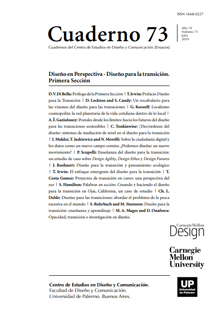Preface
Abstract
Fundamental change at every level of our society is needed to address the issues confronting us in the 21st century. Climate change, loss of biodiversity, forced migration, depletion of natural resources, and the widening gap between the rich and the poor are just a few of the “wicked problems” that require new approaches to problem solving. Transition Design or “design for transition” brings together two powerful memes: (a) the idea that entire societies will need to transition toward sustainable futures, and (b) the realization that this will involve systems-level change informed by a deep understanding of the anatomy and dynamics of complex systems. This emerging field of “transition studies” now encompasses a community of international researchers from the areas of social and management sciences, engineering, activism, and related disciplines. However, contributions from the field of design and its related sub-disciplines are still relatively rare, and Transition Design seeks to address this gap. This is surprising given the degree to which design permeates socio-technical systems and is implicated in most of the wicked problems previously mentioned. This ubiquity, along with the evolution of design in recent decades to become a highly integrative discipline, positions design and designers as potentially powerful leverage points for positive systems-level change.
References
Boenhert, J. (2008). Design and transition: What designers can learn from the transition movement. Paper presented at the Changing the Change: Designs, Visions, Proposals and Tools Conference, Torino, Italy.
Ceschin, F. (2012). The introduction and scaling up of sustainable Product-Service Systems: A new role for strategic design for sustainability (Doctoral dissertation). Retrieved from https://www.politesi.polimi.it/handle/10589/56785
Design Transition: Ecological Literacy in Design Education. (n.d.) Ecological Literacy in Design Education by 2012. Retrieved from http://teach-in.ning.com/
Gaziulusoy, A. I. (2010). System innovation for sustainability: A scenario method and a workshop process for product development teams (Doctoral dissertation). Retrieved from http://aut.researchgateway.ac.nz/handle/10292/3699?show=full
Gaziulusoy, A. I. (2018). Postcards from “the edge”: Towards futures of designing for sustainability transitions. Cuadernos Journal. Publication in preparation.
Hopkins, R. (2006, 28 April). Willits comes to Kinsale! [Web log post]. Retrieved from https://www.transitionculture.org/2006/04/28/willits-comes-to-kinsale/
Irwin, T. (2011). Wicked problems and the relationship triad. In S. Harding (Ed.), Grow small, think beautiful: Ideas for a sustainable world from Schumacher College (pp. 232- 259). Edinburgh: Floris.
Irwin, T., Tonkinwise, C., & Kossoff, G. (2015). Transition design: An educational framework for advancing the study and design of sustainable transitions. Paper presented at the Sustainability Transitions Research Network Conference, Brighton, United Kingdom.
Irwin, T. (2015). Transition design: A proposal for a new area of design practice, study and research. Design and Culture Journal, 7(2), 229–246. DOI:10.1080/17547075.2015.1051829
Joore, P. (2010). New to improve: The mutual Influence between new products and societal change processes (Doctoral dissertation). Retrieved from https://www.researchgate.net/publication/308781532_New_to_Improve_-_The_Mutual_Influence_between_New_ Products_and_Societal_Change_Processes
Kossoff, G. (2008). The reconstitution of the domains of everyday life: A tool for assessing the health of existing conditions and a framework for designing sustainable solutions based on principles from the natural world. Paper presented at the Changing the Change: Designs, Visions, Proposals and Tools Conference, Torino, Italy.
Kossoff, G. (2011a). Holism and the reconstitution of everyday life: A framework for transition to a sustainable society. In S. Harding (Ed.), Grow small, think beautiful: Ideas for a sustainable world from Schumacher College (pp. 122-142). Floris: Edinburgh.
Kossoff, G. (2011b). Holism and the reconstitution of everyday life: A framework for transition to a sustainable society (Doctoral dissertation). Retrieved from http://ethos.bl.uk/OrderDetails.do?uin=uk.bl.ethos.699805
Kossoff, G., Irwin, T., & Tonkinwise, C. (2015). Transition design: The importance of lifestyles and everyday life as a leverage point for sustainability transitions. Paper presented at the Sustainability Transitions Research Network Conference, Brighton, United Kingdom.
Kossoff, G., Irwin, T., & Willis, A. (Eds.) (2015). Transition design [special issue]. Design Philosophy Papers, 13(1). http://dx.doi.org/10.1080/17547075.2015.1051829
Kossoff, G. (Ed). (2018). Transition design: Widening the conversation. Proceedings of the 2016 Dartington Transition Design Symposium. Dartington: United Kingdom (forthcoming).
Southern Star Staff. (2006, January 17). Kinsale Council Supports Transition Town Venture. The Southern Star. Retrieved from http://www.resilience.org/stories/2006-01-17/kinsalecouncil-supports-transition-town-venture/
Rooney, L. (2006). Kinsale transition town: Projects for 2006. Retrieved from https://www.transitionculture.org/wp-content/uploads/PresentationtoTC6thFeb.doc
Los autores/as que publiquen en esta revista ceden los derechos de autor y de publicación a "Cuadernos del Centro de Estudios de Diseño y Comunicación", Aceptando el registro de su trabajo bajo una licencia de atribución de Creative Commons, que permite a terceros utilizar lo publicado siempre que de el crédito pertinente a los autores y a esta revista.


